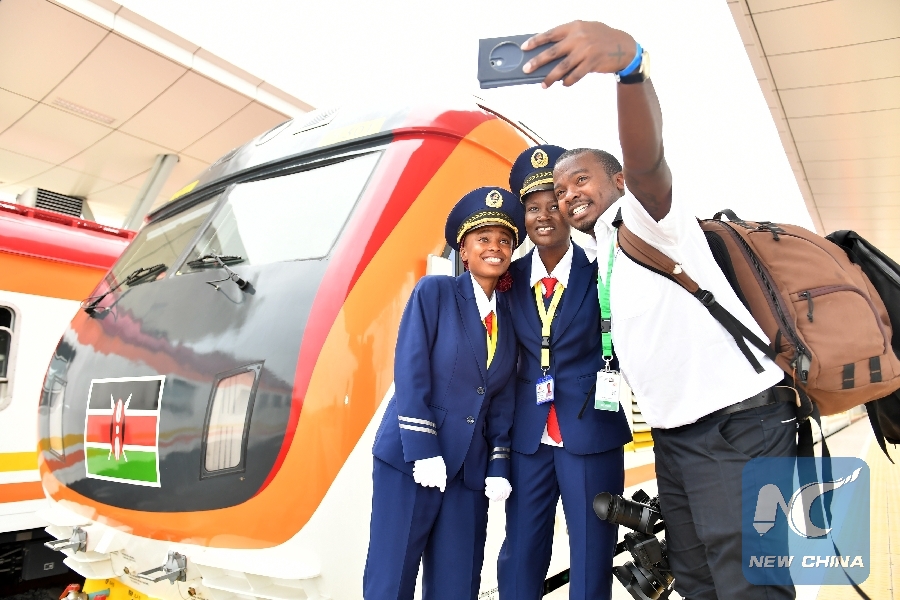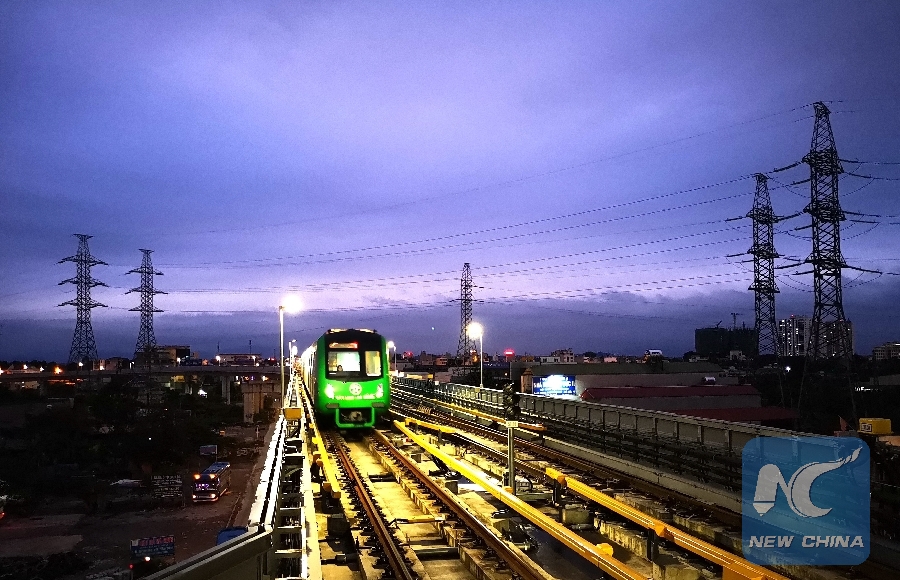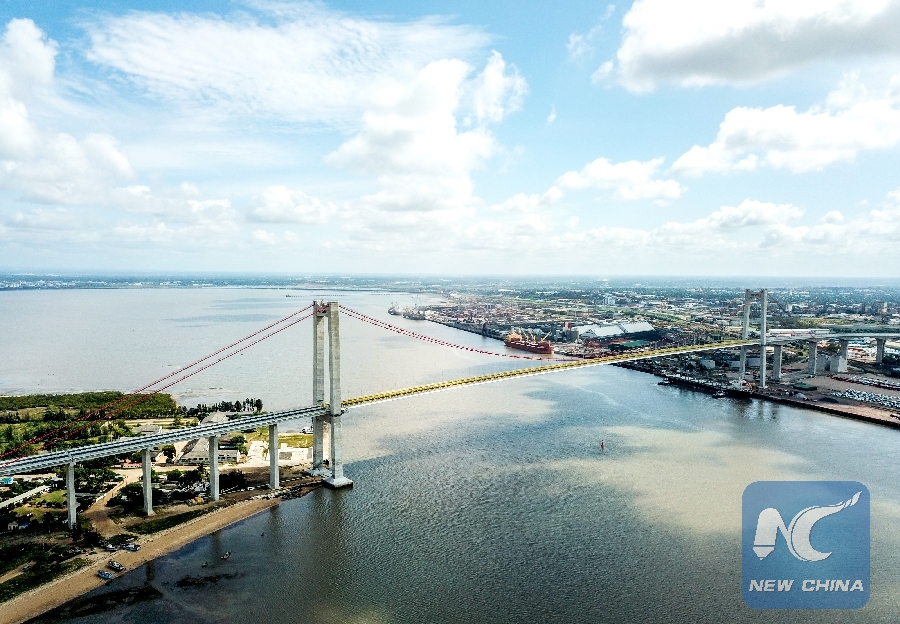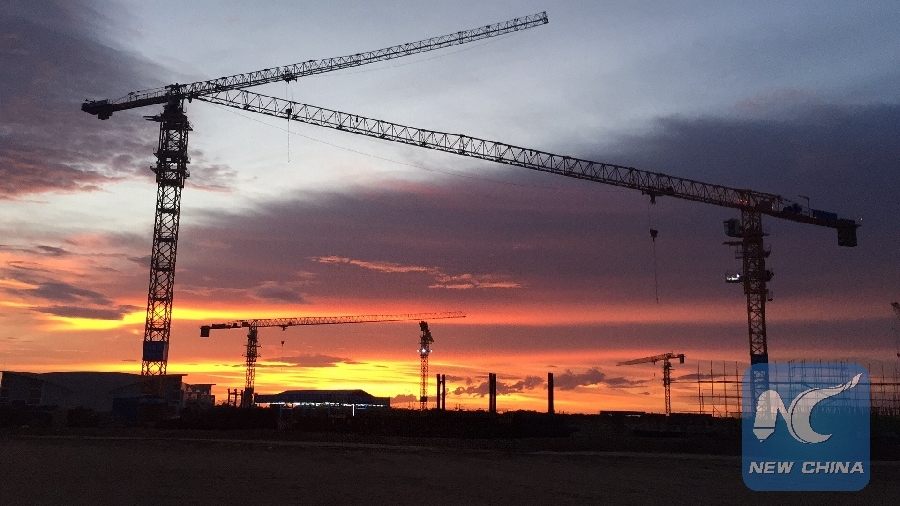
A Kenyan journalist takes a selfie with female train drivers Concilia (C) and Alice (L) during the launching day of the Mombasa-Nairobi Standard Gauge Railway (SGR) in Mombasa, Kenya, on May 31, 2017. (Xinhua/Sun Ruibo)
by Xinhua writer Wang Jiangang
UNITED NATIONS, May 22 (Xinhua) -- Few places in the world match the United Nations' iconic style, history and stature, which makes catered events at the UN Delegates Dining Room a memorable and superlative experience that guests will appreciate for years to come.
For June Sappakit, a female waiter who has been working at this unique dining place for 19 years, what have really aroused her interest recently are not those celebrities who sometimes come from outside the UN building to have meals in this dining room, but China's Belt and Road Initiative (BRI), which has been the theme of various events held here over the past years.

A train is on trial run on Vietnam's first urban railway, the Cat Linh-Ha Dong elevated rail line, in Hanoi, Vietnam, Dec. 30, 2018. The rail line was constructed by China Railway Sixth Group Co. Ltd. From Cambodia to Ethiopia to Georgia, economic and industrial zones have become an increasingly important dimension of international cooperation within the framework of the Belt and Road Initiative (BRI). (Xinhua/Yang Kunpeng)
The UN Delegates Dining Room at the UN headquarters in New York is the place where UN officials and other people dine, and the venue where UN member states and non-UN organizations and companies hold events of various types.
Speaking of her growing strong interest in the BRI, Sappakit said that "what interests me is that China is seeking to connect many countries by helping build railways, highways and other infrastructure facilities in related countries...It is a very good program catering to the interests of people in countries along the Belt and Road."
Wearing a beautiful smile, Sappakit, a Thai American in her 40s, told Xinhua recently that she is "very supportive of the Belt and Road Initiative and falls in love with it as well."

Aerial photo taken on April 8, 2019 shows the Maputo Bay Bridge in Maputo, Mozambique. The longest twin-tower suspension bridge in Africa, which hovers across the Maputo Bay with a main span of 680 meters, was officially open to traffic in November of 2018. The bridge is part of the Maputo Bridge and Link Roads project built by the China Road and Bridge Corporation, with Chinese standards and financing support. (Xinhua/Zhang Yu)
Thanks to what she constantly sees and hears from what is happening in the dining room, Sappakit said that she is gradually displaying "an increasingly strong interest" in the BRI.
"There has been a dramatic increase in China-themed events held in the dining room over the past few years," she noted. "What people say at related events about the BRI often attracts my attention while I'm serving the guests, and constantly arouses my curiosity to learn more about the initiative."
"The BRI is trying to create good life for people in related countries. On the contrary, a small number of countries care too much about making big money by selling lethal weapons to countries trapped in internal conflicts. As a result, conflicts will never cease with constant inflow of weapons," said Sappakit, with eyes looking down.
Speaking of China, her eyes glittered.
"The reason why I give thumbs-up to China is because it is only providing countries with what they really need and what are beneficial to the improvement of local people's well-being."
"Weapons are awful, but nobody resents highways and railways, and investment," she added.

Photo taken on June 14, 2018 shows the construction site of a China-funded national stadium in the Morodok Techo National Sports Complex in Phnom Penh, Cambodia. The construction on a China-aided new national stadium in Cambodia has gone full steam ahead of the project completion plan set by the end of 2020. From Cambodia to Ethiopia to Georgia, economic and industrial zones have become an increasingly important dimension of international cooperation within the framework of the Belt and Road Initiative (BRI). (Xinhua)
Sappakit's parents and some of her relatives have moved to live in the United States, and she still has many relatives in Thailand. "The messages about the BRI that they send me from my motherland have always been very positive."
"What I have learned from some events held at the UN have been positive and inspiring as well," said Sappakit, noting that "this world with so many conflicts need countries like China, which put economic development and people's happiness first."
China has become "a buzzword" at the UN over the years, Sappakit said. "Many of the events held at the delegates dining room are related to China in one way or another. The 'Belt and Road' Initiative and 'Building a Community with Shared Future for Mankind' have become so popular among us waiters."
"Besides, Chinese food festivals, painting shows, liquor tasting events, singing and dancing performances and other Chinese cultural activities are constantly held here, which have made me learn a lot about China and the Chinese people as well," said Sappakit.
Talking about her concerns about the world, Sappakit paused for a second. "This world is really far from tranquil: you attack me, and I fight back. It's really bad."
"The Chinese people are so smart and wise that they know unreasonable fighting and conflicting waste too much money and sometimes ruin a country's reputation. It's fantastic that China has thoroughly dedicated itself to economic development and improving the wellbeing of its own people and people in many other countries."
"Big powers should follow China's example, and focus more on development, less on fighting," she said, holding a wine glass in each hand facing each other in the air.

